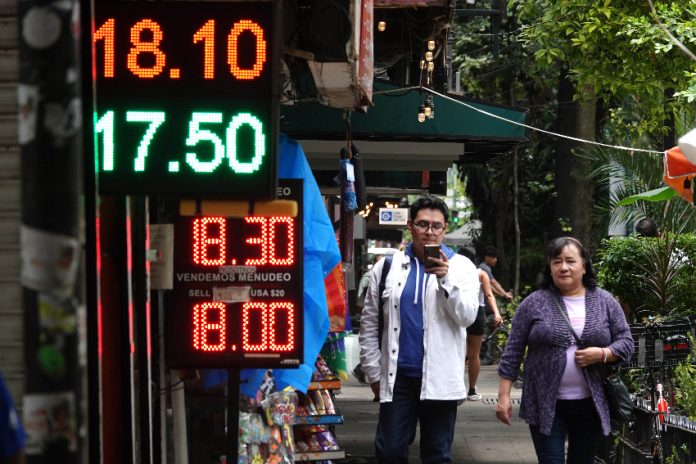The Mexican peso remains significantly weaker than it was before the June 2 elections, but it improved slightly against the US dollar on Thursday after President-elect Claudia Sheinbaum announced her first cabinet picks.
The El País newspaper reported that the peso gained 0.3% against the greenback moments after Sheinbaum announced that former foreign affairs minister Marcelo Ebrard will be her economy minister once she is sworn in as president on Oct. 1.

The peso was trading at 18.31 to the dollar at around midday Mexico City time, not long after the president-elect named Ebrard and other members of her cabinet:
- Alicia Bárcena (environment)
- Juan Ramón de la Fuente (foreign affairs)
- Rosaura Ruiz (science)
- Julio Berdegué (agriculture)
- Ernestina Godoy (legal advisor)
CI Banco said in a note that “the market’s interpretation seems to be that Sheinbaum’s cabinet are officials who have extensive technical and political capabilities.”
The USD:MXN rate was 18.36 at 4:30 p.m., according to Bloomberg. The closing rate on Wednesday was 18.42.
Based on the 18.36 rate, the peso has depreciated more than 7% against the U.S. dollar since Sheinbaum and the ruling Morena party’s comprehensive victory in the federal elections on June 2.
Morena and its allies won a two-thirds majority in the Chamber of Deputies and a strong majority in the Senate. That places the Morena-led coalition in a strong position to approve a raft of constitutional reform proposals submitted to Congress by President Andrés Manuel López Obrador earlier this year.

The likelihood of the proposed reforms being approved — particularly ones that seek to overhaul the judiciary, make changes to Mexico’s electoral system and eliminate various autonomous government agencies — has caused major concern in markets and led the peso to depreciate.
Shortly after the elections, Sheinbaum sought to calm markets by announcing that current Finance Minister Rogelio Ramírez de la O would remain in his position when she takes office, and endorsing a set of economic commitments he outlined.
She also promised that “broad consultation” would take place before reform proposals are considered by Congress and declared that investors have “nothing to worry about.”
However, the president-elect was unable to stop the peso sliding to almost 19 to the dollar last week.
The peso had recovered somewhat from that position when it got an apparent boost by the announcement that Ebrard will be Mexico’s next economy minister.
Reuters reported that the former foreign minister — who was an initial competitor with Sheinbaum for the Morena presidential candidate nomination — is “widely considered a business-friendly [cabinet] pick,” adding that he “successfully managed relations with the United States” during his almost five-year tenure as the nation’s top diplomat.
El País reported that Ebrard is “perceived by markets as a politician with better ties to the private sector” than current Economy Minister Raquel Buenrostro.
As economy minister, he will be in charge of Mexico’s future trade negotiations.
In a short speech after his appointment, Ebrard said that the world today has become “more protectionist” and “to some extent more unstable” than it was previously.
“The assignment [we have] is to navigate those stormy waters with everything we’ve learned in our lives,” he said.
Ebrard later told reporters that the 2026 scheduled review of the United States-Mexico-Canada Agreement, or USMCA, will be a top priority for him, along with the pending ratification of a new trade pact between Mexico and the European Union.
He also noted that the Economy Ministry has been tasked with attracting more foreign investment to Mexico, including investment related to the growing nearshoring trend.
Another responsibility for Sheinbaum’s economy minister pick will be the development of a chain of industrial parks in the Interoceanic Corridor of the Isthmus of Tehuantepec, located between Salina Cruz, Oaxaca, on Mexico’s Pacific coast and Coatzacoalcos, Veracruz, on the Gulf coast.
